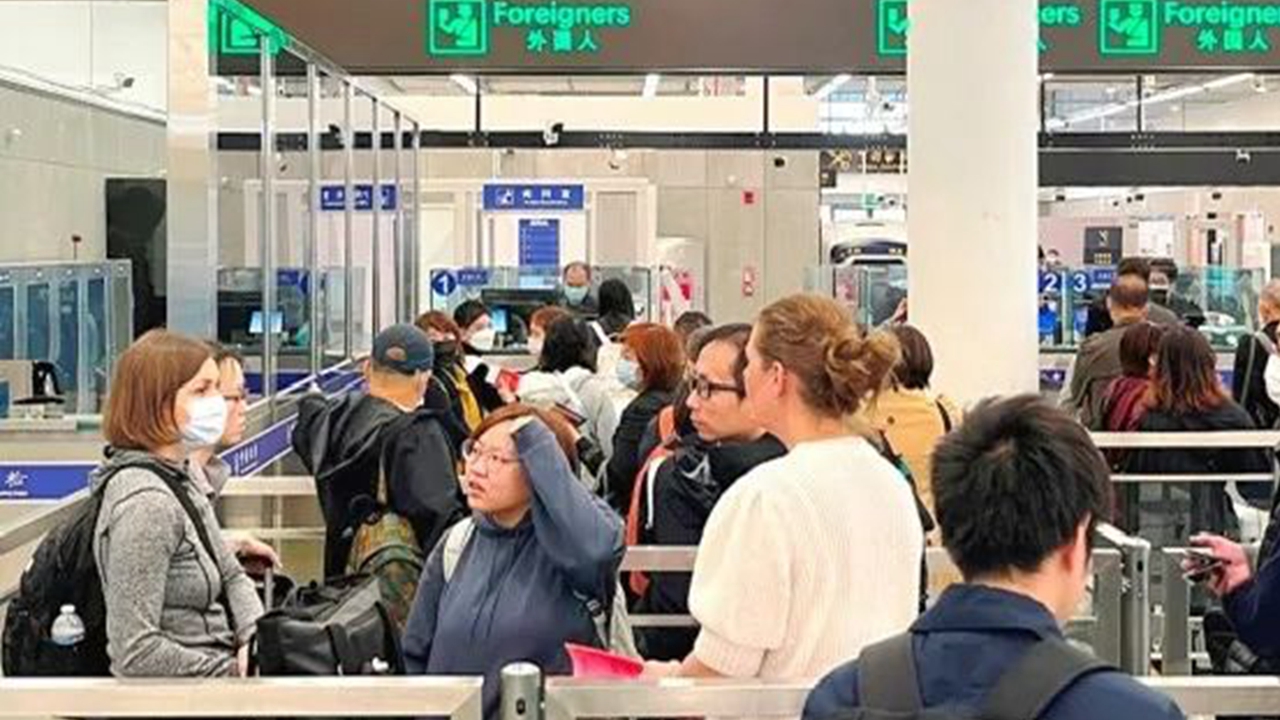Policy Spotlight | Port visa guidelines, incentives to FIEs & more
Writer: | Editor: Zhang Chanwen | From: | Updated: 2024-03-19
Authority gives guidelines for port visa application
China's National Immigration Administration has rolled out a detailed guide clarifying the rules around port visas, making it easier for foreigners who need to travel to China in urgent cases. The guidelines come in a Q&A format, covering key policy-related issues in both Chinese and English.
Port visa is one of the five visa measures China announced in January to facilitate the entry of foreign nationals into China for business, education, and tourism purposes. The policy allows foreigners who need to visit China urgently apply for a port visa on arrival.

Travelers enter the Chinese mainland via Huanggang Checkpoint in Shenzhen. Photo from Dute News
According to the guide, port visa services are now available at 99 ports across 72 major Chinese cities that see large international passenger traffic.
The Q&A comprehensively addresses key aspects of the port visa process, defining what constitutes an "urgent need" for entry, detailing required documentation, outlining eligibility criteria for visa extensions, renewals, or re-issuances, and providing guidance on applying for group tourist port visas.
To avoid rejected applications that could interrupt travel arrangements, the Immigration Administration recommends applicants to submit preliminary applications to the port visa authorities first and then proceed with the formal application after obtaining initial approval.
In Shenzhen, port visa services are available at the following ports:
Luohu Checkpoint罗湖口岸
E-mail: luohuke1688@163.com
Tel: (86-0755) 8232-4022
Huanggang Checkpoint皇岗口岸
E-mail: hgk1688@163.com
Tel: (86-0755) 9829-6372
Shekou Cruise Center 蛇口游轮中心
E-mail: szbskk@163.com
Tel: (+86-0755) 2669-1202
Shenzhen Bao'an International Airport 宝安国际机场
E-mail: szbjck001@163.com
Tel: (+86-0755) 2345-9289
Fuyong Port 福永码头
E-mail: szbjck001@163.com
Tel: (+86-0755) 2345-9289
For the detailed Q&A and a complete list of the service-providing ports in China, tap to read:
中国口岸签证相关答问|FAQs About Port Visas and Other Related Issues
Qianhai issues new rules for rewarding foreign-funded enterprises
The Qianhai Authority recently issued a new incentive to reward foreign-invested enterprises based on the increase in actual foreign capital used in Qianhai from the previous year.

A view of Qianhai. Photo from Shenzhen Special Zone Daily
A single enterprise can receive a maximum reward of 30 million yuan (US$4.16 million) per year. These measures will take effect March 25 and will be valid for a period of three years.
According to the new rules, foreign-invested enterprises will be eligible for rewards if they increase the actual foreign capital they use in Qianhai by no less than US$5 million over the previous year. They will be awarded 1% of the annual actual foreign capital used.
For increased investment of no less than US$30 million, the reward will be calculated at 1.5% of the annual actual foreign capital used.
Previously, Qianhai provided a 1% reward to foreign-invested enterprises based on the actual annual amount of foreign capital used.
Parking reservation to be available at checkpoints
Parking lots at five Shenzhen checkpoints (Hong Kong entry/exit points) are now available for reservation through the WeChat miniprogram “i口岸.”

An aerial view of Liantang Checkpoint in Luohu District. Sun Yuchen
The checkpoints include Futian Checkpoint, Wenjindu Checkpoint, Liantang Checkpoint, Shenzhen Bay Checkpoint, and Luohu Checkpoint. Together, they offer over 2,800 parking spaces.
For a detailed user guide, please tap to read:
User guide for parking reservation at checkpoints 深圳口岸实行全面预约停车
Flexible ticketing program extended
The flexible cross-border train ticketing program between Futian Station in Shenzhen and West Kowloon Station in Hong Kong has now been extended to include Shenzhen North Station.

A high-speed train stops at Shenzhen North Railway Station in Longhua District. Photo from Shenzhen Daily
The move aims to further boost connectivity between the two cities.
Under the program, passengers with valid tickets to and from the aforementioned stations can apply for ticket modifications free of charge on their date of travel, up to three times.
For details, tap to read:
Flexible ticketing program extended 广深港跨境“灵活行”延长至深圳北
Shenzhen pioneers self-regulation for power bank rental services
Few people can leave home without carrying a portable power charger in our modern world. However, if you live in Shenzhen, that may not be the case because the city's power bank rental service network is extensive enough to make power shortages for mobile devices a thing of the past.
The Shenzhen Consumer Council is further enhancing the worry-free experience by unveiling China's first self-disciplinary regulation for the power bank sharing industry.

Power bank self-rental stations can now be found in many locations such as restaurants, shopping malls and conference venues across the city. File photo
The regulation makes several pledges to improve service quality. It extends the free rental period to at least five minutes and reduces the billing time slot to a maximum of 30 minutes. Additionally, it promises stringent quality control measures, including factory inspections, and guarantees an efficient complaint handling mechanism.
Before the regulation was released last Monday, the free rental period policies for power chargers varied from one to two minutes among companies.
Seven major power bank sharing companies in Shenzhen, including Jiedian, Soudian, Laidian, Beidian, Energy Monster, Meituan, and Xiachong, have signed the pledge to safeguard consumer rights.
This regulation will cover nearly 200,000 power bank sharing stations in Shenzhen.
The Shenzhen Consumer Council promises continuous and strong supervision of the implementation of the regulation. The council believes that the power bank sharing industry will experience a healthy and orderly development by working with regulatory authorities, technical institutions, and leading companies to research and formulate industry standards.
New Policy Introduced to regulate rental middlemen
Tenants can now say no to balcony- or storage-room-turned living quarters, as a new regulation on the city's rental market has given clear definitions for minimum rental unit.
The regulation, "Notice on Regulating Subleasing and Entrusted Operation of Rental Housing in Shenzhen, " was released by the Housing and Construction Bureau of Shenzhen Municipality in an attempt to curb the prevalent practice of "secondhand landlords" — individuals or companies that rent multiple properties and then sublease them to tenants.
In the regulation, the minimum rental unit is defined as the originally designed living space, prohibiting the subleasing of kitchens, bathrooms, balconies, storage rooms or other non-residential areas as living quarters. Landlords and rental firms are barred from subdividing rooms into so-called "apartments within apartments" for subleasing.
Under the new rules, any individual subleasing 10 or more rental units must register as a business and obtain an operating license specifying housing rental as the business scope. They must also file records with the Shenzhen Housing Rental Supervision Service Platform within a designated timeframe.
The policy prohibits actions such as nonpayment of rent to landlords, arbitrary rent increases for tenants, or withholding security deposits. Upon lease expiration or termination, landlords must promptly return remaining rent and security deposits after deducting contractually agreed fees.
Rental companies and registered individuals charging tenants for utilities must adhere to government-set prices, without adding extra management or service fees to water, electricity, or gas bills.

The new guidelines mandate that the same unit must only be listed once on any given online platform. Rented or withdrawn units must be removed from all platform listings within five working days.
Furthermore, rental firms and registered individuals must establish dedicated rental fund accounts with banks to collect rent and deposits from tenants. The bank must monitor any rent exceeding three months or deposits exceeding one month’s rent.
Analysts view the policy as a much-needed step toward safeguarding the rights of Shenzhen's sizable migrant population, who have long grappled with rental issues.